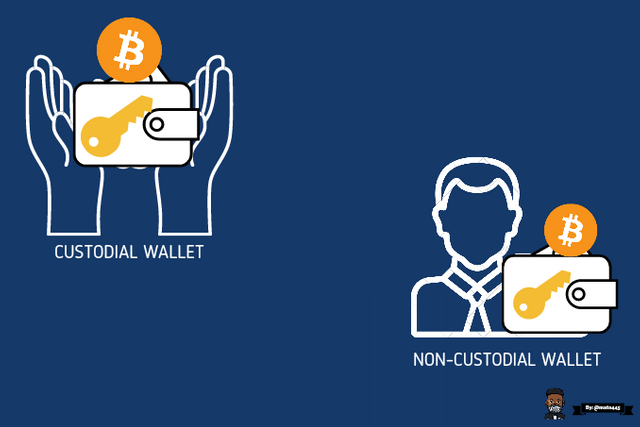What Is Custodial Wallet & Non-Custodial Wallet? - Which One Is The Best?
If you keep up with crypto news and updates, you've probably heard about Coinbase, one of the world's largest cryptocurrency exchanges. After releasing certain clear data in their current quarterly earnings report 2022, the exchange stirred some uproar. It was about a condition that states that if Coinbase goes bankrupt, all of its customers' money will be subject to bankruptcy process as well. People in the crypto community should be aware of all the exchanges that use custodial wallets. They are vulnerable to such threats, and all users should be aware of them, regardless of whether these platforms choose to share information or not.
After reading this article, you will have a basic understanding of what custodial and non-custodial crypto wallets are, as well as their benefits and drawbacks. After that, you'll be able to choose which is ideal for you. Let's get started.
Custodial Wallets
Custodial wallets are those type of wallet which the platform or wallet provider manages your funds' private keys. It usually offers backup and security, as well as customer support and the possibility to reclaim assets if they are lost or misplaced. Take, for example, the Coinbase Exchange Wallet. The firm holds the keys to your funds, while you have access to them through your account's login username and password or a 2FA.
Benefits
- This platform or wallet provider are users friendly
- The provider offers customers support and other customers related services
- You can easily recover your account if lost or misplaced
- The platform or wallet provider offers an easy to user interface for users to easily navigate through.
Drawbacks
Remember this saying "not your key, not your money", you don't have access to your keys as it's managed by the platform or wallet provider.
The wallet provider or platform requires KYC from users
- The platform is prone to hack or any form of attack, even bankruptcy isn't left out as what Coinbase has highlighted.
Non-Custodial Wallets
Non-Custodial Wallets, also known as Self-Custody Wallets, put control in the hands of their users. You are in charge of your own security and keys. Metamask and cold wallets like Ledger are two examples. They enable you to engage with blockchain in order to gain access to funds using your password and seed phrase! You're on your own if you lost or misplaced your keys, since you're responsible for it.
Benefits
- More security, since you're totally responsible for your private keys.
- Since you're in control of your keys abs responsible for them, you've full control over your funds, no third party or platform
- Some custodia wallet provider do charge fee for sending and receiving funds, note; this is different from the blockchain fee, but there's nothing like that on non-custodial wallet, the only fee you'll pay is the blockchain fee, the wallet provider will never charge fee from you.
- You don't need any KYC to access or login
Drawbacks
- Non-Custodial is technical, as it requires you to have some crypto knowledge or skill
- No customer support or services
- Since there are no customer support, if you lose your keys, you automatically lose your funds and no way to recover it.
- Not user-friendly, and newbies will find it difficult to navigate around it.
Which One Is The Best?
I've explained both custodial and non-custodial wallet, listed the benefits and drawbacks. It all basically comes down to how secure you want your crypto lifestyle to be!
Custodial Wallets: If you're a trader or you're new to the crypto world with little to no experience, custodial wallets are a good choice because they're easy to use, and offers guide and support
Non-Custodial Wallets: If you wish to protect your funds or assets with additional protection and monitor the keys by yourself then non-custodial wallet are good choice.
The majority of individuals in the crypto ecosystem use a combination of the two, for me I use custodial wallet like Binance to trade and sell my coin to Fiat, and non-custodial wallet to hold some largest part of my investment. I'm responsible for my keys in non-custodial wallet while the platform (Binance) is responsible for my keys in custodial wallet.
In Summary:-
I've discussed custodial wallet and non-custodial wallet, the benefits and drawbacks of this two wallet, the one that is best for you based on your level of crypto understanding and how much security you want.
I hope newbies and other crypto enthusiast have learnt something from this article.
Thank you for reading, God bless you
10% Payout To @tron-fan-club

Thank you for contributing to #LearnWithSteem theme. This post has been upvoted by @fabio2614 using @steemcurator09 account. We encourage you to keep publishing quality and original content in the Steemit ecosystem to earn support for your content.
Regards,
Team #Sevengers
Thank you so much @fabio2614
You have done well in explaining the differences in the two terms and you have also cewlrly explained their various benefits.
Thank you.
Glad that you found my article useful... I appreciate your comment
Love the piece you have written and thanks a lot for taking the time to educate us on this issue regarding custodial and non-custodial wallet, though personally I feel the best is Non-custodial wallet which gives us full ownership of our set of private keys
Thanks for sharing my friend
Very nice post if I do say so myself I made something similar a few months back but mine wasn't as informative. Personally when it comes to exchanges, I prefer customized but when it comes to wallets, I prefer to hold my private keys
Keep up the good work
Yeah... As a trader you'll definitely need both.. thank you for visiting